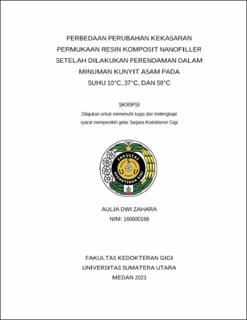| dc.description.abstract | The food or drink we consume has different temperature values. Changes in temperature that occur can affect the surface roughness of restoration material nanofiller composite resin. Surface roughness that occurs can also be affected by drinks containing acids, such as turmeric-tamarind drinks. The purpose of this study was to determine the differences in changes in surface roughness of nanofiller composite resin after immersion in turmeric tamarind drink at 10°C, 37°C, and 58°C. The research design was a pretest and posttest group design. A total of 30 samples were made from nanofiller shade A2 enamel composite resin in the form of discs with a diameter of 10 mm and a thickness of 2 mm. Samples were divided into three groups, which were temperature 10°C (I), temperature 37°C (II), and temperature 58°C (III) with each group consisting of 10 samples. Measurement of the surface roughness of the sample was carried out before and after seven days of immersion using a Stylus Profilometer. Changes in surface roughness sequentially in groups I, II, and III were 2.455 ± 0.339 μm; 2.579±0.228 μm; and 2.608±0.212 μm. The results of Wilcoxon test showed that there was a significant difference in surface roughness of samples before and after immersing in turmeric tamarind drink of the three treatment groups with p=0.005 (p<0.05). The results of the Kruskal-Wallis test obtained p=0.488 indicating that there was no significant difference in changes in surface roughness of the three groups after immersion. From this study, it can be concluded that changes in the surface roughness of nanofiller composite resin after immersion at 10°C, 37°C, and 58°C did not show significant differences. | en_US |

